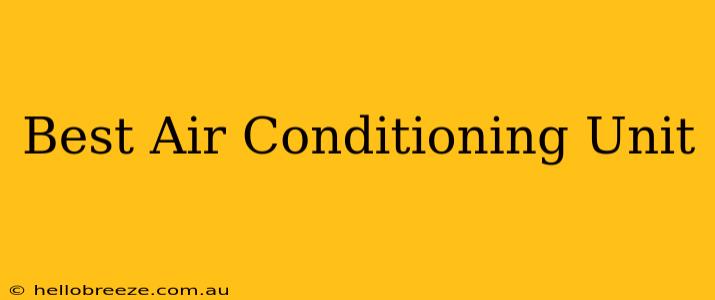Finding the best air conditioning unit can feel overwhelming. With so many options available, choosing the right one for your home or office can be a real challenge. This comprehensive guide will help you navigate the process, considering factors like size, type, energy efficiency, and budget to help you find the perfect fit.
Understanding Your Cooling Needs
Before diving into specific models, it's crucial to understand your cooling requirements. Several key factors influence the size and type of AC unit you need:
- Square Footage: The size of the space you need to cool is paramount. A unit that's too small will struggle to cool the area effectively, while one that's too large will cycle on and off constantly, wasting energy and potentially leading to higher electricity bills.
- Climate: The climate in your region dictates the cooling capacity (BTUs) required. Hotter and more humid climates will require higher BTU units.
- Insulation: Proper insulation significantly impacts cooling efficiency. Well-insulated homes require smaller and less powerful units.
- Number of Windows and Their Orientation: South-facing windows, for instance, receive more direct sunlight and contribute to increased heat gain.
Types of Air Conditioning Units
There are several types of air conditioning units, each with its own advantages and disadvantages:
1. Window Air Conditioners
- Pros: Affordable, easy to install, good for single rooms.
- Cons: Can be less energy-efficient than other options, may obstruct windows, not ideal for large spaces.
2. Portable Air Conditioners
- Pros: Flexible placement, good for renters, easy to move between rooms.
- Cons: Less efficient than window or central units, require venting, can be noisy.
3. Central Air Conditioners
- Pros: Cool entire homes evenly, very efficient, improved indoor air quality with filtration systems.
- Cons: Expensive to install, requires professional installation, not ideal for small spaces or apartments.
4. Ductless Mini-Split Systems
- Pros: Zone control (cool specific rooms independently), energy-efficient, quiet operation, ideal for additions or spaces without ductwork.
- Cons: More expensive than window or portable units, requires professional installation.
Key Features to Consider
Regardless of the type you choose, pay attention to these features:
- SEER Rating (Seasonal Energy Efficiency Ratio): A higher SEER rating indicates greater energy efficiency, translating to lower energy bills.
- BTU (British Thermal Unit): This measures the cooling capacity of the unit. Choose a BTU rating appropriate for the size of the space.
- Noise Level: Look for units with quieter operation, especially if placed in bedrooms or living areas.
- Smart Features: Many modern AC units offer smart capabilities, such as Wi-Fi control, allowing you to adjust settings remotely.
- Filters: High-quality filters improve indoor air quality and reduce allergens.
Choosing the Best Air Conditioning Unit for You
The best air conditioning unit depends entirely on your individual needs and budget. Carefully consider the factors discussed above to make an informed decision. Don't hesitate to consult with HVAC professionals for personalized recommendations. Investing in a high-quality, appropriately sized unit will ensure comfortable and efficient cooling for years to come, saving you money on energy costs and maximizing your comfort.
Maintaining Your Air Conditioner
Regular maintenance is crucial for extending the lifespan of your air conditioner and ensuring optimal performance. This includes:
- Cleaning or replacing air filters regularly.
- Checking refrigerant levels (professional service recommended).
- Inspecting and cleaning coils.
- Scheduling annual professional maintenance.
By following these tips, you can keep your AC unit running smoothly and efficiently, enjoying cool comfort for many seasons to come. Remember to always consult professional HVAC technicians for complex issues or installations.

